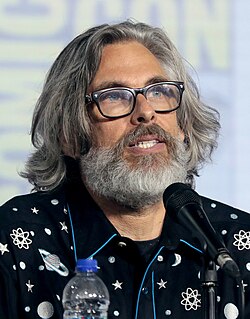Michael Chabon Quote
When at last his moment came, he rose and stood, the only mourner at his end of the room, a solitary tower imprisoning an anonymous sorrow. First he wished for a Redeemer whose arrival he did not expect and a redemption he knew to be impossible. Then he told God all the nice things God seemed to need to hear about Himself. Finally, he wished for peace as it was conventionally understood, which he supposed was unobjectionable if no more likely than the coming of a messiah. At any rate, as Uncle Ray once explained to him, if you examined the language, the concluding lines of the kaddish might have been interpreted as a wish that God and everyone else would just, for once, leave the speaker and all his fellow Jews alone.
When at last his moment came, he rose and stood, the only mourner at his end of the room, a solitary tower imprisoning an anonymous sorrow. First he wished for a Redeemer whose arrival he did not expect and a redemption he knew to be impossible. Then he told God all the nice things God seemed to need to hear about Himself. Finally, he wished for peace as it was conventionally understood, which he supposed was unobjectionable if no more likely than the coming of a messiah. At any rate, as Uncle Ray once explained to him, if you examined the language, the concluding lines of the kaddish might have been interpreted as a wish that God and everyone else would just, for once, leave the speaker and all his fellow Jews alone.
Related Quotes
About Michael Chabon
born May 24, 1963) is an American novelist, screenwriter, columnist, and short story writer. Born in Washington, D.C., he spent a year studying at Carnegie Mellon University before transferring to the University of Pittsburgh, graduating in 1984. He subsequently received a Master of Fine Arts in creative writing from the University of California, Irvine.
Chabon's first novel, The Mysteries of Pittsburgh (1988), was published when he was 24. He followed it with Wonder Boys (1995) and two short-story collections. In 2000, he published The Amazing Adventures of Kavalier & Clay, a novel that John Leonard would later call Chabon's magnum opus. It received the Pulitzer Prize for Fiction in 2001.
His novel The Yiddish Policemen's Union, an alternate history mystery novel, was published in 2007 and won the Hugo, Sidewise, Nebula and Ignotus awards; his serialized novel Gentlemen of the Road appeared in book form in the fall of the same year. In 2012, Chabon published Telegraph Avenue, billed as "a twenty-first century Middlemarch", concerning the tangled lives of two families in the San Francisco Bay Area in 2004. He followed Telegraph Avenue in November 2016 with his latest novel, Moonglow, a fictionalized memoir of his maternal grandfather, based on his deathbed confessions under the influence of powerful painkillers in Chabon's mother's California home in 1989.
Chabon's work is characterized by complex language, and the frequent use of metaphor along with recurring themes such as nostalgia, divorce, abandonment, fatherhood, and most notably issues of Jewish identity. He often includes gay, bisexual, and Jewish characters in his work. Since the late 1990s, he has written in increasingly diverse styles for varied outlets; he is a notable defender of the merits of genre fiction and plot-driven fiction, and, along with novels, has published screenplays, children's books, comics, and newspaper serials.
